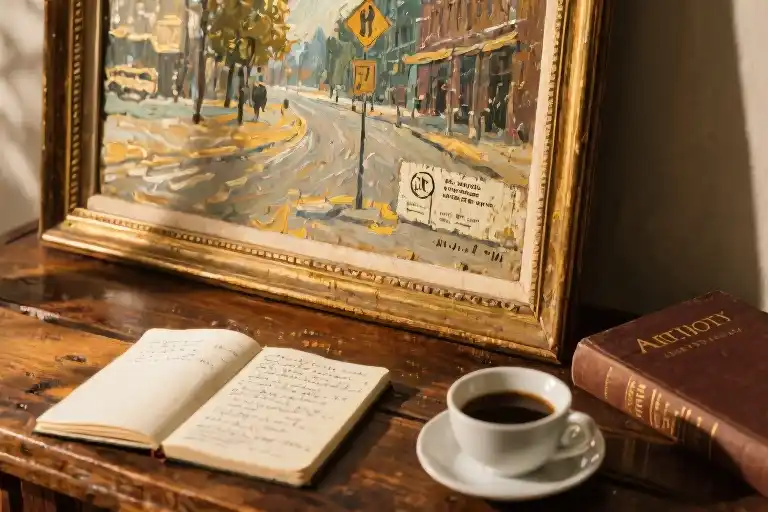The flashing red and blue lights in my rearview mirror triggered a Pavlovian response – hands at ten and two, foot off the accelerator, license already mentally retrieved from my wallet. Through the rain-streaked window, I watched a training manual slide off the patrol car’s dashboard as the officer approached. The manual’s title, barely visible through the downpour, might as well have read ‘How to Shatter a 40-Year Perfect Driving Record.’
My fingers tightened around the steering wheel as reality set in. Four decades of meticulous driving – through three cross-country moves, two teenage drivers in the household, and one memorable incident involving a suicidal deer – all undone by what would soon be revealed as a training exercise. The irony wasn’t lost on me when my copy of Aristotle’s Nicomachean Ethics peeked out from my tote bag, its golden spine glinting mockingly in the intermittent streetlights.
Rain drummed a staccato rhythm on the roof as the rookie officer’s pen hovered uncertainly over his citation pad. His supervising partner’s voice carried through the damp air: ‘This is an excellent learning opportunity.’ My civic duty had apparently evolved into becoming a pedagogical specimen. The calculator in my mind started running numbers – the fine amount climbing in perfect sync with my blood pressure.
What followed was a masterclass in bureaucratic theater. The trainee’s hands trembled slightly as he referenced his manual between each painstakingly slow field he completed. The more experienced officer offered corrections with the patience of a Montessori teacher, occasionally glancing at me with what I interpreted as apologetic resignation. The entire process took twenty-three minutes (I timed it), during which I mentally composed six different versions of my eventual online payment – each with progressively more creative descriptions in the memo field.
As the final copy of my citation was handed over, the supervising officer offered what was meant to be comforting wisdom: ‘These training stops help make better officers.’ I nodded automatically, my eyes catching on a single raindrop making its way down the citation form, blurring nothing of consequence. The symbolism wasn’t subtle – my pristine driving history now bore its first blemish, and no amount of meteorological drama could make it more or less significant than it actually was.
Back in my car, Aristotle’s treatise stared up at me from the passenger seat. The ancient philosopher’s words about virtue ethics and rational behavior suddenly felt less like academic abstraction and more like a personal challenge. I placed the ticket carefully in the center console, right next to the book – two documents about human behavior, one ancient, one freshly printed, both demanding my reflection.
The Teaching Traffic Ticket
The flashing red and blue lights in my rearview mirror triggered an automatic response – hands at ten and two, foot off the accelerator, a quick mental review of my driving over the past few miles. After four decades of incident-free driving, this routine felt almost theoretical. Until that Tuesday afternoon.
The young officer approached my window with the careful steps of someone walking on thin ice. His fingers trembled slightly as they grasped the citation booklet, his eyes darting between my license and the manual’s pages like a student during a pop quiz. ‘Ma’am,’ he began, then paused to clear his throat, ‘you were going 42 in a 30-mile zone.’
Behind him, the supervising officer leaned against their patrol car with folded arms, offering occasional nods of approval. When our eyes met, he offered a professional smile and the words that sealed my fate: ‘This is an excellent training scenario.’ The calculator in my mind immediately started running – the fine amount climbing in sync with my rising irritation.
There’s a particular sting when you realize you’ve become someone else’s educational opportunity. My pristine driving record, maintained since the disco era, now served as practice material for a rookie officer’s training. The irony wasn’t lost on me as I watched him carefully copy my information, his tongue peeking out in concentration like a child writing his first cursive letters.
As the thermal printer whirred to life producing my citation, I noticed the training manual slip from the patrol car’s seat onto the pavement. The pages fluttered open to the section on ‘issuing speeding violations’ – my personal contribution to law enforcement education now literally lying in the street. The supervising officer picked it up with a chuckle, brushing off the gravel before handing it back to his protégé.
In that moment, I understood this transaction went beyond traffic safety. My civic duty unexpectedly included participating in someone else’s professional development. The calculator in my head finally settled on a number – not just the dollar amount, but the emotional cost of being a good sport about becoming a training exercise. The receipt I received felt less like a traffic citation and more like an invoice for an unplanned life lesson.
What stayed with me longest wasn’t the monetary penalty, but the supervisor’s parting comment as they returned to their vehicle: ‘We appreciate your patience with our new officers.’ The words hung in the air between citizen and civil servant – a reminder that sometimes society’s machinery requires ordinary people to become teaching aids in unexpected moments.
The Tug-of-War Between Reason and Emotion
The electronic payment confirmation on my husband’s phone screen glared at me with finality. His matter-of-fact approach to handling the speeding ticket stood in stark contrast to the crumpled calendar page I’d instinctively torn from the wall – the one marking the exact date my 40-year clean driving record officially ended. This cognitive dissonance between civic responsibility and personal frustration created an emotional whiplash that no traffic school could prepare you for.
Three distinct moments crystallized this internal conflict during those brooding days:
1. The Insurance Call That Cut Deep
When the cheerful customer service representative congratulated me for ‘maintaining such an impressive driving history all these years,’ her well-intentioned remark landed like a backhanded compliment. The cognitive behavioral therapy enthusiast in me recognized this as textbook catastrophizing – transforming a single traffic violation into an existential threat to my identity as a responsible driver. Yet the emotional processing part of my brain kept replaying that supervising officer’s voice: “This will be a good training case.”
2. The Lemon Paradox
Our refrigerator actually contained lemons that week – plump, yellow, and waiting to be transformed into summer lemonade. The metaphorical lemons life had handed me felt considerably more tart. My husband’s suggestion to ‘just make lemonade’ seemed impossibly glib when faced with the paperwork proving my perfect record’s demise. This tangible representation of the ‘turning negative into positive’ philosophy sat uneasily with my need to properly mourn what felt like a personal failing.
3. The Paper Trail of Mixed Emotions
The torn calendar page migrated from trash can to desk drawer to finally being smoothed out and tucked into my journal – a physical manifestation of my emotional journey. Like Aristotle’s concept of akrasia (acting against one’s better judgment), I understood intellectually that releasing the resentment would benefit me, yet some stubborn part clung to the injustice. The cognitive dissonance between knowing I should practice emotional management and actually feeling those emotions created a sort of psychological friction that generated unexpected heat.
What emerged from this tension was an important realization about emotional processing: sometimes we need to fully experience our irrational reactions before achieving genuine resolution. The gap between my husband’s pragmatic ‘just pay it’ approach and my visceral reaction highlighted how emotional management isn’t about skipping steps, but moving through them with awareness. Those days of brooding, as uncomfortable as they were, created the necessary pressure that would eventually lead me to the writing solution – my personal form of turning life’s lemons into something more palatable.
This emotional tug-of-war taught me that between reason’s clean electronic transactions and emotion’s crumpled paper trails lies the messy but fertile ground where genuine personal growth takes root.
The Alchemy of Ink: Dissolving Anger Through Writing
The notebook page bore witness to my emotional storm – jagged letters screaming ‘This isn’t fair!’ in graphite fury. My initial writing therapy session resembled more of a temper tantrum than thoughtful reflection, the pen stabbing the paper with each exaggerated loop. That first cathartic outburst filled three-quarters of a page before my hand cramped from the tension.
Between deep breaths, something shifted. The fourth attempt began differently: ‘At least he didn’t make me walk a straight line.’ The absurdity of that mental image – a middle-aged woman performing roadside sobriety tests – coaxed an unexpected chuckle from my tightened throat. My writing pace slowed as the therapeutic benefits of journaling began their subtle work, the ink becoming less about blame and more about understanding.
By the third writing session, the transformation crystallized. A new piece emerged, beginning with: ‘Dear Officer-in-Training…’ The words flowed with surprising compassion as I described seeing his nervous fingers fumble with the citation pad. Emotional management through writing had performed its quiet magic – where I’d initially seen only an impersonal system, I now recalled human details: the way his uniform collar bunched awkwardly, the supervisor’s patient corrections, the genuine apology in his voice when handing me the ticket.
This cognitive restructuring happened almost without conscious effort. Research confirms what I experienced – expressive writing creates psychological distance, allowing us to reframe negative events. My personal growth through writing followed the classic pattern:
- Emotional Dumping (initial rage-filled pages)
- Perspective Broadening (noticing mitigating circumstances)
- Empathy Building (considering the officer’s viewpoint)
- Meaning Making (finding value in the experience)
Key moments in my writing process revealed turning points:
- Page 2, paragraph 4: ‘Would I rather he practiced on someone actually dangerous?’
- Margin note: ‘This costs less than traffic school would have’
- Final draft: The realization that maintaining a perfect driving record for 40 years mattered less than how I handled its ending
The notebook became my emotional processing lab, each page an experiment in turning negative into positive. Where logic alone failed (‘just pay the ticket’), the physical act of writing succeeded by engaging multiple brain regions simultaneously. This explains why writing therapy often works when simple reasoning doesn’t – it integrates our analytical and emotional faculties.
Three writing techniques proved particularly effective for processing this frustration:
- Stream-of-Consciousness Venting (no editing, pure emotion)
- Dialogue Writing (imagined conversations with both officers)
- Third-Person Perspective (recounting the event as an observer)
My finished essay – polished through this therapeutic process – bore little resemblance to those first angry scribbles. The writing had served its purpose far beyond creating a piece of text; it had restructured my emotional response. Where there was bitterness, I found amusement. Where I felt victimized, I recognized my role in a larger system. The ticket remained, but its emotional sting had been neutralized by ink and introspection.
This experience reinforced why writing remains humanity’s most enduring emotional management tool – older than Aristotle’s philosophies, more personal than modern AI solutions. The blank page asks only for honesty, rewarding us with clarity no algorithm can replicate. My traffic citation became tuition for a different kind of lesson: the transformative power of translating turmoil into typed or written words.
Life Lessons in the Rearview Mirror
That traffic ticket remained stubbornly present in my mind long after the payment cleared. Like a persistent dashboard warning light, it kept blinking at inconvenient moments – while waiting in line at the grocery store, during my morning shower, even as I watched the evening news. The rational part of me understood this was disproportionate, yet the emotional side demanded an audience.
Three Questions That Changed My Perspective
During one particularly restless night, I conducted what psychologists might call a cognitive restructuring exercise. I posed three simple questions to myself:
- What’s the worst possible outcome of this situation?
- A slightly higher insurance premium for three years
- Approximately two hours lost dealing with paperwork
- The temporary bruising of my driving ego
- What positive elements can I find in this experience?
- A new officer gained valuable field training
- My clean record demonstrated this was truly exceptional
- The incident occurred without any safety risk
- What would Aristotle say about my reaction?
- That virtue lies between deficiency and excess in emotional response
- That civic duty sometimes requires personal sacrifice
- That wisdom means distinguishing between injustice and inconvenience
These questions didn’t magically erase my irritation, but they created enough mental space for perspective. The writing process became my emotional processing lab, where I could safely examine reactions that felt embarrassingly intense for a traffic violation.
Two Unexpected Discoveries
As I journaled about the experience, two significant realizations emerged:
First discovery: Drafting an angry letter to the police department proved far less therapeutic than writing a reflective essay. The former kept me anchored in resentment, while the latter helped me navigate toward acceptance. Research supports this phenomenon – expressive writing studies by Dr. James Pennebaker demonstrate how structured reflection creates better emotional outcomes than venting.
Second discovery: My forty-year perfect record had become an invisible burden. Maintaining that flawless history required constant vigilance and created unreasonable expectations. The ticket, ironically, liberated me from that self-imposed pressure. Perfectionism often masquerades as virtue until life gently (or not-so-gently) reminds us that growth requires occasional stumbles.
One Counterintuitive Insight
The most valuable lesson emerged from an uncomfortable truth: some of life’s most important lessons require paying with our dignity rather than our dollars. That young officer needed to practice procedural skills in real-world conditions. My role as the “practice citizen” felt undignified in the moment, but served a larger purpose in officer training and public safety.
This insight transformed how I view minor injustices. The grocery checker learning to handle coupons, the trainee barista remaking my latte, the new customer service representative navigating their first complaint – we all pay small dignity taxes to help others develop essential skills. Recognizing this pattern makes the occasional inconvenience feel more meaningful.
The Aftermath
That ticket now lives on my inspiration board, nestled between a concert ticket and a handwritten quote from Marcus Aurelius. It serves as a tangible reminder that emotional management through writing creates lasting value from temporary frustrations. The monetary fine faded into our household budget, but the personal insights continue yielding returns.
Perhaps you have your own version of this story – not necessarily about traffic tickets, but about those moments when life charged you an unexpected emotional toll. How did you process the experience? What hidden lessons emerged when you examined it closely? The answers might surprise you as much as mine surprised me.
The Framed Life Lesson on My Inspiration Board
That traffic ticket now occupies a peculiar place of honor on my writing inspiration board, sandwiched between a pressed four-leaf clover and a quote from Marcus Aurelius. Its edges have softened from months of handling, the once-crisp municipal paper now bearing the gentle creases of frequent contemplation. This rectangular slip of bureaucratic paper became my most unexpected muse.
“Have you ever received a life ticket worth framing?” I often ask workshop participants during writing therapy sessions. The question usually elicits puzzled smiles before the recognition dawns – we’ve all accumulated those metaphorical citations where life seemed to arbitrarily enforce its rules upon us. The parking ticket during a job interview. The library fine on a book that brought comfort during illness. The speeding citation that arrived precisely when you thought you had life under perfect control.
What makes these mundane injustices transform into framed wisdom isn’t the events themselves, but the alchemy of our response. The ticket on my board no longer represents an afternoon’s frustration, but rather commemorates three valuable discoveries:
- The Healing Power of Narrative Reconstruction – By writing through the experience, I didn’t just record events but actively reshaped their meaning. The initial angry draft (“This is highway robbery!”) gradually gave way to more reflective observations (“Perhaps the rookie officer needed this confidence boost more than I needed $142”).
- The Paradox of Perfect Records – My forty-year spotless driving history had become an invisible prison of expectations. That single blemish forced me to examine why perfectionism often steals more joy than mistakes ever could. As my journal entry from that week reads: “We don’t own our achievements – they’re on loan from the universe, collateral for life’s necessary lessons.”
- The Ancient Wisdom in Modern Frustrations – Returning to Aristotle’s Nicomachean Ethics during this episode revealed startling relevance. His distinction between technical justice (the written law) and equitable justice (the spirit behind it) perfectly captured my dilemma. No AI chatbot could have provided that depth of perspective – it required engagement with ideas tested by centuries of human experience.
The ticket’s final transformation occurred when I mailed a copy of my reflective essay to the police department’s training division. Not as a complaint, but as feedback about how small interactions shape public perception. Their appreciative response became the final layer in this unexpected correspondence.
Aristotle’s wisdom predating AI by millennia isn’t just about chronology – it’s about the enduring human capacity to derive meaning from misfortune. My framed ticket serves as a tangible reminder that some of life’s most valuable lessons arrive disguised as penalties. The true violation isn’t the initial offense, but failing to redeem the experience through reflection.
So I keep it there, next to my writing desk. Not as a trophy of victimhood, but as a testament to writing’s power to transmute leaden experiences into golden insights. The ink may fade, but the lesson remains clear: when life hands you a ticket, don’t just pay it – write through it.





